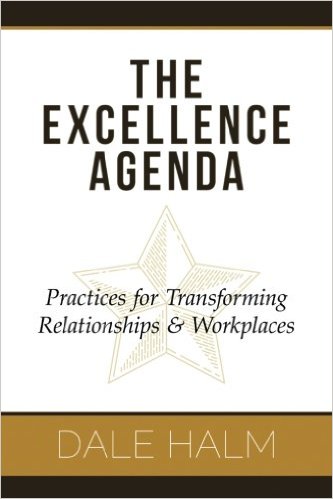Excellence Agenda
Practices for Transforming Relationships & Workplaces
Are you creating excellence in your relationships, in your workplace? This book will forever change how you approach working with others. In The Excellence Agenda, Dale Halm author and renowned business consultant, explores what it takes to truly excel. It reveals the mindset and behaviors needed for optimal performance. By offering a series of thought-provoking questions, this book provides a powerful roadmap for success. It includes:
- The Success Paradigm – alternative ways of thinking that foster collaboration
- Breakthrough Practices – crucial behaviors that lead to exceptional results
- Tools – guidelines for mastering the skills of excellence
- Excellence Survey – 20 questions to help you assess your ability to excel
The Excellence Agenda will inspire you to transform your relationships and workplace.
Featured Posts
September 3, 2022 | Dale Halm
Coaching - The Ultimate Way to Support Others
I’m hesitant to refer to the word "coaching" as a practice of excellence, as it is often misunderstood or carries a negative connotation. When I ask people in my training programs if they are open to being coached, the immediate reaction I get is, "Here it comes. He is going to tell me what I’m doing wrong." That's not coaching – that’s giving someone your opinion, regardless of the effect it might have on them.
Coaching in professional sports is seen as highly valuable. It can make all the difference between winning and losing. In relationships and the corporate world, the usual response to coaching is, "Who do you think you are? You’re not an expert in my field! How can you coach me?"
The type of coaching I am referring to is the process of providing real time input with the intention of bringing out the best in others. When coaching, we point out constructive as well as ineffective behaviors. Coaching is not an assault, nor is it being condescending. In fact, it is quite the opposite. It signals to others that you are acting on their behalf. Most people gloss right over that concept. When you realize the act of coaching is really about caring, you see it in a new light.
Coaching is being active, responding to what is happening in the moment, rather than avoiding or failing to address things. When you are committed to an agenda for excellence, you set high expectations for yourself and others. If you are not coaching others or willing to accept coaching, then you are not really committed to excellence.
For years, I worked in the semiconductor and utility industries where safety is paramount. Enormous effort is put forth to create a culture of safety in these types of businesses. The best indicator of an outstanding safety culture is when people can have direct and honest conversations with each other. By specifying unsafe behaviors or reinforcing safety standards, serious accidents can be prevented. People must first, gather up the courage to address an issue (provide coaching), and secondly, they must be receptive and act on the input given (accept coaching). In this type of culture, people simply won't tolerate unsafe behavior. They demonstrate compassion and support of their co-workers by coaching one another to be safe.
To achieve organization excellence, we must do the same when it comes to how we work together. We must have the tenacity to speak up and coach others, as well as receive and act on feedback. Here are five questions you can reflect on to help you be a more effective coach.
- Am I willing to act on the coaching I received?
- Do I demand excellence from myself and others?
- Am I coaching in a supportive and constructive manner?
- Do I realize how important coaching is to creating a culture of excellence?
- When others are demonstrating ineffective behavior, do I provide the necessary coaching?

